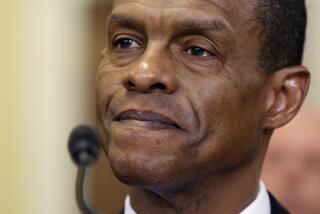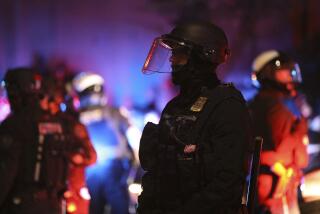Portland rethinks stance on counter-terrorism policing
Reporting from Portland, Ore. — This is a city that has staked out its independence from the federal government loudly and often.
Staffers of then-President George H.W. Bush nicknamed Portland “Little Beirut” for the virulent protests that greeted him whenever he made an appearance there.
When his son George W. Bush came to town for a fundraiser in 2003, the mayor sent a bill to the White House in an unsuccessful attempt to recoup more than $100,000 in police overtime and extra expenses the city spent to keep angry demonstrators in check.
But when it comes to counter-terrorism, the city may be on the brink of relinquishing its one-of-a-kind stance.
In 2005, Portland became the only major metropolitan area in the country to withdraw its police officers from the Joint Terrorism Task Force, an intelligence-gathering partnership between local and federal law enforcement.
On Feb. 24, the City Council is scheduled to vote on whether to reverse its decision in the wake of a high-profile terrorism scare in the city.
At the time of the 4-1 vote to withdraw, city officials cited concerns about lack of local oversight over the two Portland officers assigned to the task force.
Then-Mayor Tom Potter, a former police officer and chief, said he feared participation in federal investigations would put the local officers in the position of violating state laws that forbid collecting and retaining information about the political, religious and social activities of people not suspected of committing a crime.
The issue remained dormant until November, when Mohamed Osman Mohamud, a 19-year-old naturalized U.S. citizen from Somalia, was arrested and charged with plotting to set off a bomb during the city’s Christmas tree-lighting ceremony in Pioneer Courthouse Square.
The “bomb” in question was a dud supplied to Mohamud by undercover FBI agents, and federal officials said Portland’s residents were never in serious danger. But the incident reignited the debate over the city’s involvement in federal terrorism investigations.
Portland’s withdrawal from the task force was never complete. The police chief remains part of the task force’s executive group, receiving periodic briefings, and Portland police officers can be pulled in to work with the FBI on a case-by-case basis. But the day-to-day working relationship is gone.
In the case of the Christmas tree bomb plot, the FBI briefed Portland’s police chief about the investigation in September, when it was nearly at an end. The chief had to sign a nondisclosure form, and Mayor Sam Adams was not notified of the case until three hours after Mohamud’s arrest.
If Portland’s two officers had still been assigned to the task force, police would have been in the loop on the investigation from the start, said Arthur Balizan, special agent in charge of the FBI’s Portland division.
National authorities and activists are watching Portland’s decision with interest. Top officials from the FBI and Justice Department on one side and the American Civil Liberties Union on the other pleaded their respective cases before the Portland City Council on Tuesday.
Law enforcement officials cited the potential for Portland’s airport, river port and other facilities to be used to launch terrorist attacks that would strike elsewhere in the nation.
U.S. Atty. Gen. Eric H. Holder Jr. wants to see Portland rejoin the task force, said Todd M. Hinnen, deputy assistant attorney general for the Justice Department’s law and policy office.
Dwight Holton, U.S. attorney for the district of Oregon, agreed with him.
“This is not just about protecting Portland; this is about protecting people in communities throughout the world,” he told the council.
Holton said Portland’s withdrawal left his colleagues elsewhere in the country “surprised and confused.” But the move was typical of Portland’s fiercely independent spirit.
“We’re not afraid to stake out what we think is best for us and best for others, and sometimes that means that we’re not making decisions like other cities,” said Mayor Adams, who was on the council in 2005.
Adams said he voted to pull back from the task force because he distrusted the Bush administration and was disturbed by provisions in the Patriot Act. He wouldn’t say how he plans to vote this time around.
For some Portlanders, the distrust of law enforcement dates to the days of J. Edgar Hoover, the FBI head who became notorious for targeting alleged political subversives.
For others, the memories are fresher. In 2004, local attorney Brandon Mayfield was arrested and held for two weeks without charges after being erroneously linked to a train bombing in Spain. He eventually won a $2-million settlement from the federal government.
It’s unclear which way the vote will go. In the meantime, onlookers will have to wonder whether the city affectionately or derogatorily nicknamed the People’s Republic of Portland will choose to “keep Portland weird” when it comes to homeland security.
More to Read
Sign up for Essential California
The most important California stories and recommendations in your inbox every morning.
You may occasionally receive promotional content from the Los Angeles Times.











